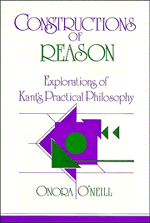Book contents
11 - Constructivisms in ethics
Published online by Cambridge University Press: 05 June 2012
Summary
Somewhere in the space between realist and relativist accounts of ethics there is said to be a third, distinct possibility. One such position, allegedly both antirealist and antirelativist, is John Rawls's “Kantian constructivism”, first formulated in A Theory of Justice and since elaborated in a series of papers. Rawls's critics doubt whether he has found any stable third possibility. On closer inspection, they suspect, every elaboration of the theory depends either on unvindicated transcendent moral claims or on the actual ethical beliefs of some society.
If these suspicions are well founded, Rawls has not constructed a position that is neither realist nor relativist. Nor have his critics shown the constructivist project impossible. However, they may have shown a great deal about constraints on the wider project by concentrating on the specific difficulties of Rawls's constructivism. I shall discuss Rawls's responses to those critics as a route into an account of a variant constructivism that may be less likely to be absorbed either into moral realism or into relativism.
Designs for original positions
Rawls's responses to his critics can be traced in successive formulations of his position. A Theory of Justice outlined his well-known method of “reflective equilibrium” for determining principles of justice. The method seeks coherence between “our considered moral judgments” and the principles that would be chosen by rational beings whose specific identities and desires have been obscured by a controversially tailored veil of ignorance, which defines a canonical “original position”.
- Type
- Chapter
- Information
- Constructions of ReasonExplorations of Kant's Practical Philosophy, pp. 206 - 218Publisher: Cambridge University PressPrint publication year: 1990
- 4
- Cited by



